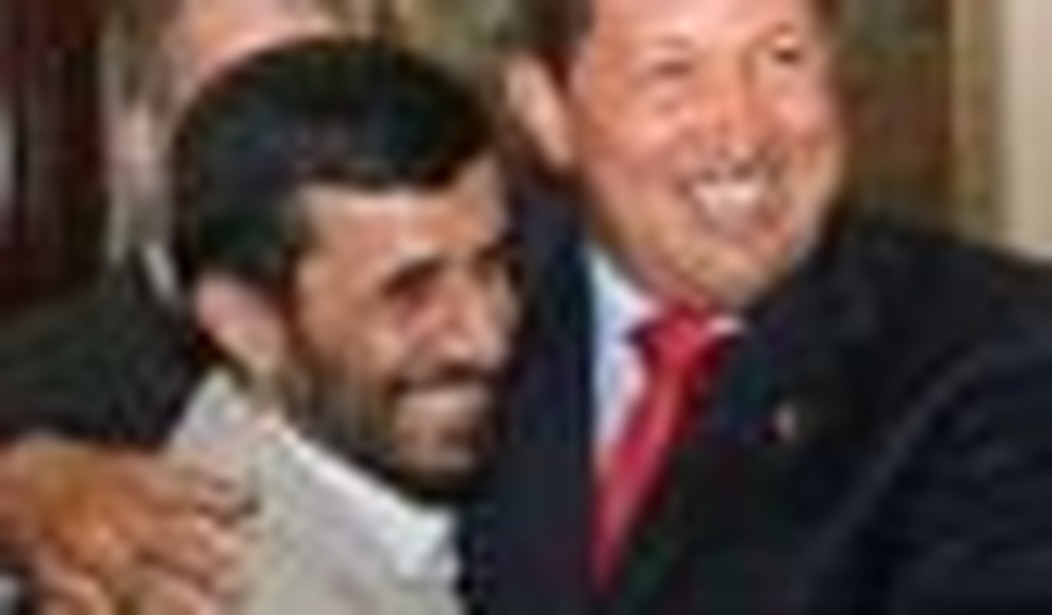The conflict with Iran is entering a new, more dangerous phase. Video of Mahmoud Ahmadinejad holding a meeting with high-level officials on June 13 in Qom has leaked out, giving us insight into how he sees the near future.
“A new revolution has begun,” he says, as the Islamic Revolution finds its “true destiny” and enters a more difficult period. He speaks with genuine optimism and enthusiasm, and says it will not be limited to Iran. The tape clearly shows that Ahmadinejad believes that something has just changed that makes this moment in history special and directly related to Iran’s role in Allah’s plans.
The tape also brings bad news for Iran’s students. Ahmadinejad calls for an expansion of “Islamic culture” in the universities, attributing domestic unrest to a lack of training of the younger generation. Students should expect a complete rewriting of the curriculum to “Islamize” the education, and even stricter puritan-like enforcement of Sharia law and indoctrination. From the sound of it, a second Iranian cultural revolution is on the way.
The purging of dissident elements from the regime and increasingly extreme measures to silence the opposition, the language of Ahmadinejad at this meeting, and recent actions taken by the Iranian government strongly indicate that the regime is becoming more radical in the belief that doing so now is an act of obedience to Allah. The capturing of Iranian weapons in Afghanistan, the increased violence in Iraq, the escalation of violence between the Yemeni government and Iranian-backed Houthi rebels, and the arrest of an al-Qaeda cell in Kuwait trained by their colleagues in Iran show that they are increasing support for this “new revolution” outside their borders, just as it was stated in the tape.
The Iranian reaction to the United States’ offer of direct talks regarding their nuclear program reflects a new boldness and an even more confrontational attitude. The regime ruled out any discussion centered on its program, but instead insisted on talks regarding worldwide nuclear disarmament and, reportedly, the various conflicts in the region. Something had to have happened to explain why the regime has suddenly become emboldened and remarkably honest about its refusal to give up its nuclear program, rather than try to lure the West into its consistently successful dog-and-pony show.
It could be because, as U.S. intelligence concluded, the Iranians now have enough uranium for a nuclear bomb and they need only enrich it to the high levels required to act as the fuel for such a weapon, but it’s unclear how long that will take them. The Israeli and U.S. intelligence communities still estimate that this will happen between 2010 and 2015, with the latter feeling it will be further into the future and the former being less optimistic.
This current posture is increasing support for crippling sanctions among members of Congress and the Obama administration. One would think that the Iranian regime would look upon such a development with fear given its reliance upon imported refined gasoline and decide to cloak its intentions until the tide passes, but the regime has not, and that may be because of Venezuela’s decision to come to the rescue.
Venezuela has agreed to export 20,000 barrels of gasoline to Iran each day, softening the impact of such potential sanctions. Chavez has also disclosed plans for Iran to begin a “nuclear village” in his country, probably the beginnings of joint efforts towards nuclear weapons production capabilities like we’ve seen Iran engage in with North Korea, Syria, and Sudan. This relationship could also allow the Iranians to mine for uranium in Venezuela, allowing them to overcome the shortage that was expected to face them over the next year.
Venezuela’s helping hand, the lack of sustained Western support for the Iranian opposition, and the Russian opposition to tougher sanctions are undoubtedly encouraging the regime to feel it has the freedom to show its true colors and act more aggressively.
At the same time, however, the internal threat to Iran’s rulers has not subsided. As I’ve written earlier, the Green Revolution has just taken a new form. There aren’t massive crowds of over a million people, but there are relentless, scattered acts of opposition nationwide. The Iranian people are spreading the word about protests by writing down their locations and times on paper money. Mehdi Karroubi’s stock is rising due to his propensity to take the regime head-on, accusing the security services of rape and torture. His name is being mentioned more and more often than Mousavi’s lately and the regime is taking notice, issuing an arrest warrant for his son and shutting down his offices to confiscate evidence of the rape he’s been using to energize the opposition.
Unfortunately, the clock is ticking as the regime minimizes the time it needs to build a nuclear arsenal. If it becomes widely accepted that Iran has the capability to make a nuclear weapon, look for a change in the language of the West’s leaders. They won’t talk about stopping Iran from getting nuclear capability and they may not even talk about stopping a nuclear Iran. They’ll focus on the warheads, arguing that Iran doesn’t have the delivery capability yet, and therefore there is still time.
Unless Israel delays the program through direct action or the regime falls due to internal pressure and harsh international sanctions, the debate about Iran is going to change. Expect to hear more about warheads and less about bombs. And when that debate occurs, the regime will become even more radicalized, ready to move forward with the “new revolution” that Ahmadinejad believes God has tasked the regime with carrying out.









Join the conversation as a VIP Member